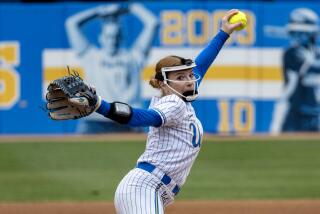Volleyball Opposites Attack
- Share via
Together, they once formed the Dream Team of beach volleyball, a pair of old UCLA Bruins who became the Lewis and Clark of the Assn. of Volleyball Professionals Tour, although, for symmetry’s sake, the analogies must end there.
Lewis never split in the prime of his pioneering career to join a rival expedition company, Clark never trashed Lewis’ exploratory abilities in the newspaper and members of the Dream Team do, on occasion, still exchange pleasantries.
Karch Kiraly and Sinjin Smith, the biggest names in the history of beach volleyball, once a barnstorming tag-team that rollicked and rolled through tournaments from Santa Cruz to Muscle Beach, are estranged.
Today, they begin competition in the World Championships of Beach Volleyball at UCLA as spokesmen and banner-carriers for opposing sides in the ongoing battle for the soul--and control--of their sport.
In this corner, at 36, representing the AVP with more than $2.5 million in career winnings and the first gold medal in Olympic beach volleyball, is Kiraly.
In the other corner, a newly turned 40, with more career victories than anyone on either tour, is the most valuable player of the FIVB, the playing point man of the Federation Internationale de Volleyball, Smith.
Their partnership ended in 1984, after combining for 21 professional victories on the beach, and their friendship was scuttled on the rocks of last year’s controversy over qualifying procedures for the Olympics.
“I didn’t have anything against him personally,” Kiraly says, “but I was critical--and still am--of an Olympic qualification system that allowed a certain team to be exempt of Olympic trials when everybody else had to compete in the Olympic trials. . . . And it just so happened he was a beneficiary of that rule.”
Long story short, Smith was granted automatic entry into the Olympics because of his FIVB ranking--the FIVB laying out the Olympic qualifying guidelines--while Kiraly and other members of the Miller Lite/AVP Tour had to play their way in by surviving an Olympic trials tournament.
Kiraly complained bitterly about what he perceived as a double standard, his anger spilling over into a personal attack on Smith’s playing ability. Kiraly openly questioned Smith’s credentials for inclusion in the Olympic field, noting that Smith and his partner, Carl Henkel, hadn’t won once on the FIVB tour in 1996.
“That confused me,” Smith says, looking back. “Karch is not a dumb guy. His statements were based on ignorance, really. He really didn’t know where my level was or where Carl’s was. The [AVP] guys who had participated in some of the international events with us knew that I could still play the game.”
Smith proved his point in the Olympic quarterfinals, extending Kiraly and his partner, Kent Steffes, to the brink before losing a 17-15 classic some have described as the greatest match in the history of beach volleyball.
Afterward, Kiraly conceded that he “was mistaken. . . . The way they played today proved they should be here.”
Kiraly and Smith never spoke in Atlanta and haven’t spoken since.
“Like I said, I was pretty confused by Karch’s comments,” Smith says. “You don’t see Michael Jordan ripping on too many other basketball players. Guys at the top of their game, in that position, don’t need to be negative toward the other competitors. It doesn’t look good, I don’t think.”
Thirteen months have passed and still, Smith admits, “we don’t really communicate. It bothers me, because, one, we were friends and I don’t understand how things changed, and two, I think together he and I could do more for the sport than apart.
“I think we’re really missing out on helping the development of the sport by working together . . . although I’m not so sure he even wants to promote the sport. He seems to have concentrated solely on playing and not really doing anything outside of that.”
Kiraly contends logistics have prevented him from talking to Smith--”He’s on the FIVB tour, I’m on the AVP tour, I see him maybe once a year”--but fires back a quick volley at Smith’s suggestion that he is disinterested in promoting his sport.
“I don’t know, I’m still very interested in competing at a high level and that’s certainly my No. 1 priority,” Kiraly says. “I have no idea if Sinjin has even played this year. As a player competes less, I would imagine doing promotional work becomes a higher priority.
“I guess I feel that competing well and signing all the autographs and just being available to the fans every weekend is the way I can best promote the sport.
“I can help promote the sport best by competing better, rather than playing poorly and losing out in the tournament early.
“And that’s me. I have no idea if Sinjin’s playing a lot or doing just promotional work or what. Maybe he has a different philosophy.”
Rivalry and acrimony are age-old cornerstones in the craft of sports promotion--pro boxing would not exist without them--but Smith says beach volleyball would be better served without this rift.
“When we’re going out and selling the sport to television and sponsors,” Smith says, “it would be nice to have what some people consider to be the two biggest names in the sport working together as opposed to creating confusion in the marketplace.”
As it stands now, suffice it to say, UCLA has been host to happier alumni reunions.
* RANDY HARVEY: The sport had to take off somewhere, so why not at UCLA? C2
More to Read
Go beyond the scoreboard
Get the latest on L.A.'s teams in the daily Sports Report newsletter.
You may occasionally receive promotional content from the Los Angeles Times.






